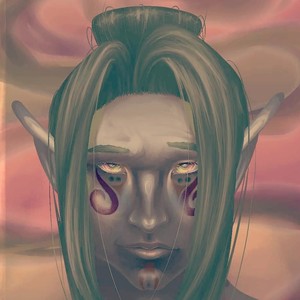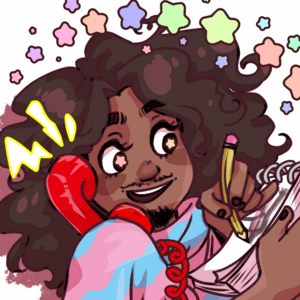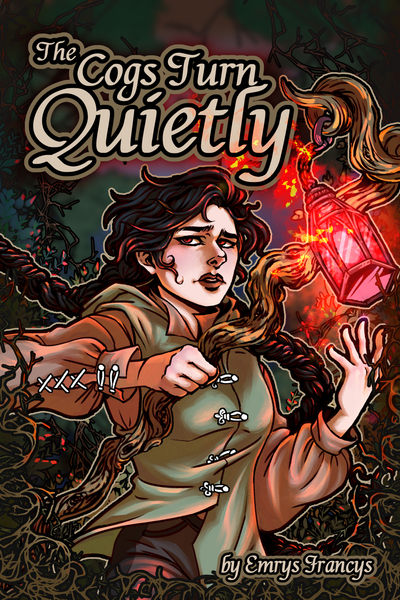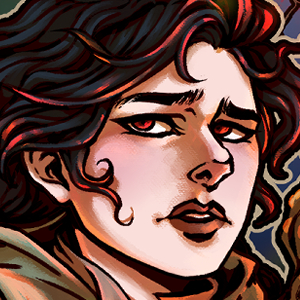“You made me use the last of my elderberries on a wild animal!” Ruskin exclaimed, a few steps behind Taru and repeating the same line he’d said a hundred times.
Bhaltair’s sleeping weight slumped down her back. The lantern, its crook stuffed down the back of Bhaltair’s shirt, bobbed and swung over Taru’s head, leaving writhing yellow worms across her vision as she rolled her eyes and shrugged the alfar higher, trying to ignore the grumblings of her stomach.
“Yeah yeah,” she grumbled, glancing off the path in either direction as they went, looking for a clear enough place to stop and make camp. “Why you making such a big deal about it, anyway?”
“What do you mean?! You had me thinking she was your pet.”
“So what? She’s not less valuable if she’s my pet. Doesn’t mean she’s not worth saving, does it?”
“It does.”
“What do you mean?” she yelped, outraged.
“Well... because... if she’s not your pet she’s not as valuable.”
Unable to turn enough to deliver her look of disbelief to Ruskin directly, Taru cast it at her own feet, instead. “Is that how you usually argue, yeah? Just change the question into a statement and hope we don’t notice?”
“I’m no bard or wordsmith,” Ruskin grumbled. “I don’t know why it makes her more valuable, all right? It just does.”
“Who says?”
“Anyone I know would tell you that a kept animal is more important than a wild one. You give them food and water and warmth and love, and because it soaks up all that energy, it becomes more valuable. It has a name! Everyone knows that something named is more important than something not.”
Taru shifted with discomfort. “That’s rubbish,” she grumbled. “Names change all the time. Can’t be that valuable.”
“But you’re wrong! How would I know you were talking to me unless you said my name?”
“Because there’s lit’rally no one else here, you numpty.” She huffed. “Talking out your backside, you. I an’t said your name since ‘undred steps back. Think I’m talking to mesen, do you?” Taru scoffed. “No: if I were talking to mesen, this’d make more sense. I wun’t be trying to argue that one living thing were more important than another just ‘cause I tagged a few sounds to it and decided that’s who it wa’! ‘Sides,” she said, shrugging Bhaltair higher, “I thought you said you’d bugger off after healing the kludde?”
Silence. Blissful… uncomfortable silence.
Taru slowed her steps. Ruskin’s continued behind her and she picked up the pace again, satisfied that he was still following. “Not that I blame you,” she confessed quietly, hoping to change the subject for one without conflict. “It’s bloody lonely round here by yourself.”
“That it is,” Ruskin said, and nothing more.
Taru nibbled her bottom lip, then asked, “You’re sure the river you found’s the Dubh?”
“Aye, no other rivers run through here.”
“Even if the place has grown?”
“The deep forest might’ve grown but Denlinne hasn’t. It's shrunk, if anything.”
Taru grit her teeth against his flippant tone and held her breath so it couldn’t carry her irritation.
Thankfully oblivious to her annoyance, Ruskin continued, “The closest other river is the Gael and that’s the other side of the valley. Comes from a different fall.”
Taru remembered the waterfall at Lake Dubh and nodded. Feeling Bhaltair slip down her back again, she huffed with the effort of shrugging them higher.
“Do you want me to take the alfar and you can take the bags?” Ruskin asked.
Taru laughed breathlessly. “Nah, thanks. I saw the way your knees buckled under ‘em.”
“My knees were fine. Besides, I still think you’re missing the point. A little magic could hold them up easy without weighing either of us down.”
“Yeah, well.” Taru shrugged Bhaltair around, though her discomfort was in her empty belly. “Probably best not to use too much magic. Might attract the wrong sort.”
“The wrong sort?” Ruskin asked, but a sudden frisson of discomfort told Taru she didn’t want to talk about it. The pair continued in silence.
-~*~-
Some time later, they heard what was definitely running water and not an infected house-sized dog struggling to breathe. It wasn’t long until Taru, Ruskin, and the still-unconscious Bhaltair reached the bank: a short steep drop to a nasty-looking crop of jagged rocks framed by the tea-coloured froth and foam of the black Dubh.
This churning maw presented a different kind of river than the lazy, night-black serpent Taru had glimpsed between the root-bare trees of Lake Dubh, never mind the peaceful partner she had sat beside at Hennessy Cottage. As she stood at the top of the bank, looking down at its teeth, she wondered if the river grew more dangerous the further they went. She hoped not: they needed somewhere less dangerous. Somewhere quiet, so she could listen out for shadows.
“Not here,” she called back, turning to find Ruskin back on the path leading away from the river. His eyes flashed in the light of her lantern. “We should follow the bank,” she called over the river noise.
Ruskin glanced either way along the path, then stepped towards her, frowning. “But the path is safer,” he called, though his voice was lost beneath the collision of water against rocks.
Taru turned, pretending she couldn’t read the disagreement on his lips, and began walking upriver.
-~*~-
Taru’s stomach was turning on itself by the time the pair found a suitable area of flat land. There, she lay Bhaltair on their bedroll before Ruskin showed her how to pitch a tent and secure the area against ants and shadow creatures.
“It’s just salt,” he said, showing her the glittering white dust in the pouch. “Just the same as you use for curing meat or adding flavour to your dad’s cooking.”
“I don’t have a dad,” she blurted, then laughed nervously and turned to scatter salt in a thick line around the camp.
“I’m sorry,” Ruskin said. “Your mum’s cooking?”
“Nope.”
Silence.
“Don’t worry about it,” Taru chuckled as lightly as she could manage. “I grew up around loads of other children without parents, so I wasn’t lonely. Loads of… friends and… stuff. I’m starving, you know?”
As if Taru had made a major revelation, Ruskin announced, “Oh, well there you are then!” and wedged the central column of his tent into the ground. “I’ve never had many friends. Not while I was growing up, not even now. I’ve spoken to lots of people but none of them keep in contact. Not really. They’ll say hello when we pass on the street, but they’re always very busy and can’t talk.” He straightened and caught Taru’s eye just as she was about to divert her attention. His lopsided smile closed too tightly in the middle. He looked away. “I suspect,” he began quietly, “that none of them are actually very busy at all. The village I live in is pretty quiet. Nothing much happens. Or, well, that’s how it was.”
“What’s changed?” Taru asked, handing him his pouch of salt.
He handed her a square paper-wrapped package in return. “That’s good in a pinch and we’re not going to be eating for a while, yet,” he said, nodding at the square and weighing the salt absently in his palm. “Well, what with the illness spreading, there’s a lot more arguing than there was. People are a lot less willing to say hello unless it’s to be followed with some grievance or other.”
“An illness?” Taru asked as she unwrapped the paper. Inside was a solid block of off-white… stuff. She glanced between it and Ruskin, but decided not to question it. “You must be busy with that,” she said instead before taking a bite.
“Me?” Ruskin’s attention darted around her face.
Taru motioned towards his equipment, trying her best not to look too disgusted: the block tasted of grease and wheat. Not the best thing she’d ever eaten. Not the worst. She struggled to swallow but it went down easy.
Ruskin looked down at himself, then up over Taru’s head as she took another bite. His hands came up to fiddle with the jars on his chest before closing around them, hiding them from view. “You’d think so,” he muttered. Then, louder, he continued, “But the doctor and the surgeon are very well-known and well-respected in the village. They’ve studied medicine all their lives, like me. They’ve nice smiles, straight backs, and firm handshakes.”
Taru swallowed and glanced at Ruskin’s hunched shoulders.
“They’re so well-liked, they’ve got apprentices from other villages: enough that there was some talk of building a big medicine school on some empty land just outside the village, but the illness hit before they could lay the foundations.”
After swallowing the last of the block, Taru announced, “Medicine’s not about nice smiles, straight backs and firm handshakes.” Wiping her hands on her waistcoat, she looked for stones for the fire. “It’s about knowing what’s needed to heal people.”
“They do that.”
“Yeah, and so do you,” Taru insisted, looking Ruskin straight in the eye. “If people don’t get that, then that’s their problem.”
Ruskin suddenly became intensely interested in searching the ground. “Bedside manner. That’s what they say I don’t have.”
“So what?” Taru tossed rocks down into a tight circle. “Unless… do your parents work at a bedside?”
Ruskin frowned at her. “Why…?” He came closer, a bundle of brown grass and twigs in his arms. “No. My father’s a gardener and my mother’s a preacher.”
Taru nodded. “So… who’s the relative whose place you’re taking?”
“I’m not taking anyone’s place!” Ruskin argued. “I got where I am by studying off my own back and experimenting at my own expense. I worked as a grave digger and nightwatchman just to be able to afford a horse to take me to the lectures I needed.”
Taru frowned, certain she’d offended him but uncertain how. “I’m sorry,” she said, “but I don’t understand. Why’re you an apothecary if you’re not taking someone’s place?”
“Because I love it!” Ruskin cried out, his face ablaze with a passion so fervent that Taru took a step back to make room. “I love plants and their properties: all the different things they can do for us or against us; all their different shapes and sizes, colours, smells. Crystals! Their frequencies and abilities; how they store what we can’t, catalyse reactions, interact with each other. I love dealing with fungi and animal parts and gases and liquids and bringing them together: seeing what they’ll make. I love learning which is the most powerful form for the medicine, or the longest lasting. Sure, I love helping people get up and walk, but really… what I really love is researching and creating such wondrous things.”
Silence settled over them. Taru’s attention flitted between Ruskin’s lightning-flash eyes. “But… so… you love it?”
“I love it.”
“But… how did you get into it?”
“At school.”
Taru shook her head. “School? Where you learn to speak and do sums?”
Ruskin nodded. “Aye, in my classes on intermaterial weavery, our teacher wasn’t very proficient but she described so vividly how dragonstone makes daffodils grow and glow that when I got home I made my dad tell me all about it.”
Taru couldn’t imagine weavery—magic—being taught in Shude. However, she could imagine that anyone who dared to try would get a short trip up to Lawvale, and a quick meeting with Duke of Law Rovena Caldecotte.
“Well, he came to life like I’d never seen before. He was ecstatic telling me about the plants and the stones and all sorts of other groupings he’d seen do strange things to the world.”
As Ruskin continued speaking, he took a pinch of purple powder from a pouch on his chest. Then, he tossed it at the dry twigs and grass in Taru’s stone circle, muttering a word that flew in sparks from his lips. It caught alight on the powder and kindling until, quickly, a fire blazed.
“We went out on the muir the next accord,” he continued. “Watched the heather and vistsilk tangle in the wind. Dad made a hot brew of the soft powder residue left on the heather. We walked home twice as fast as we’d walked out. It felt like floating on air! After that, Mum enchanted this leather-bound journal for my recipes—” he patted the book on his chest “—and Dad gave me a shed for experimenting in. We still take trips out together every accord to gather new specimens. I go by myself to get those that’re too far afield, though. Dad’s getting a bit long in the tooth to be going foraging so much, and the colder months don’t do his joints any good.”
After a few moments of fire-scented silence, Taru took a deep breath and turned to Ruskin.
“So,” she began, “you don’t have to do what your parents do?”
Ruskin blinked and laughed. “Gods no! I’d be a rubbish gardener: the only plants I’m interested in are the ones I can use.”
“What about preaching?”
Ruskin shook his head. “I’m no public speaker. Two times I’ve thrown up just thinking about talking in front of folk. It’s not for me. Though, honestly? I don’t know what it’s going to be like with this illness running rampant. A lot of people might have to have a shufty at jobs they don’t even want to do, just to keep the place going. Hopefully it won’t come to that. That’s why I’m here.”
“To find some trees?” Taru asked, holding her hands out for the warmth of the fire.
Ruskin smiled, holding his hands out too. “To find some trees.”












Comments (2)
See all